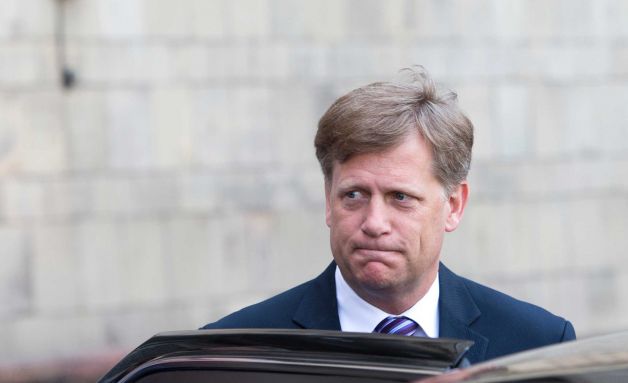
The Spy Story: An Episode in Russia’s Confusion
Publication: Eurasia Daily Monitor Volume: 10 Issue: 95
By:

As spy scandals go, the one in Moscow last week (May 14) could set a new record for oddity and senselessness. Accused Central Intelligence Agency (CIA) agent Ryan Fogle (29) was caught red-handed with a thick pad of money, a map of Moscow and, remarkably, a compass, trying to recruit a low-ranking Federal Security Service (FSB) officer for an enormous reward (Rossiiskaya Gazeta, May 15). The John le Carre-style operation was filmed and made headline news on all Russian TV channels, but made no impact whatsoever on the delicate diplomatic dance that United States Secretary of State John Kerry and Russian Foreign Minister Sergei Lavrov have been performing the last few weeks (Ezhednevny Zhurnal, May 16). Ambassador Michael McFaul had to swallow the official reprimand but refused to provide any comments, and the explanations coming from the FSB are far from triumphant, boiling down to losing patience after several warnings to the brazen US spy handlers (RIA Novosti, May 17). The extra-high publicity around the “wig-and-compass” farce makes little sense in the context of US-Russian relations, and President Vladimir Putin shrugged it off as he prepares an answer to President Barack Obama’s arms control initiative (Nezavisimoe Voennoe Obozrenie, May 17).
It makes plenty of sense, however, in the context of the Kremlin’s heavy pressure on Russian non-governmental organizations (NGO), which are being investigated with severe prejudice regarding their funding from Western sources (New Times, May 13; Novaya Gazeta, May 15). The accusations of acting on the orders from abroad, which would necessitate these NGOs’ legal identification as “foreign agents,” are often so bizarre that the Kremlin, indeed, has to try to “prove” that US spies are expanding their dirty work in Russia in the most old-fashioned way. Some groups in the opposition are discouraged by this pressure and disheartened by the unimpressive results of street protests, while others are resorting to more radical means of resistance. Consequently, the opposition Coordination Council is having a hard time trying to preserve unity and organize a new march in Moscow on June 12 (Ezhednevny Zhurnal, May 17; Grani.ru, May 18). Nevertheless, disappointment in Putin’s regime is growing, as is the opposition to the corrupt cronyism under the surface of its monolithic stability (Moskovskie Novosti, May 17).
Deteriorating economic performance and widespread expectations of stagnation underpin this discontent. Last week, Minister of Economic Development Andrei Belousov presented a sober analysis of Russia’s falling rate of growth in the last five quarters and assessments of the gradual decline of world oil prices (Kommersant, May 17). Defying his own data, he then set guidelines for an acceleration of the economy to 3.7 percent in 2014, to be driven by an inflow of investments in the miraculously improved business climate (RBC Daily, May 17). The only plausible explanation for this optimism is Belousov’s intention to quit his job, in which he is held responsible for disappearing growth, and become Putin’s economic adviser instead of Elvira Nabiullina, who is due to become the head of the Central Bank (Gazeta.ru, May 16). Putin cannot fail to see that his economic decrees are turning into wishful thinking, but berating the ministers makes scant difference, and the only strong move could be to replace Prime Minister Dmitry Medvedev with the former finance minister, Alexei Kudrin, who is biding his time within the motley opposition (Nezavisimaya Gazeta, May 16).
Putin is not ready to commit to such a cadre reshuffle even if he resents his junior partner. Medvedev does not even make a convincing scapegoat but still provides a reminder that the “national leader” is, in fact, replaceable. While keeping his distance from economic muddling, Putin concentrates more on his role as the commander-in-chief, staging a series of meetings with the top brass, about which little information is provided (RIA Novosti, May 17). Every large-scale exercise ordered by the no-nonsense Defense Minister Sergei Shoigu reveals more problems with the execution of military reforms; the reconstitution of the recently downgraded Kantemirovskaya and Tamanskaya brigades as divisions based in the close vicinity to Moscow provides only a minor feel-good factor, while adding to the problem of recruitment (Moskovsky Komsomolets, May 4). Plans to demonstrate Russia’s power-projection capabilities by deploying a naval squadron in the Eastern Mediterranean also ran into trouble because too few ships are capable of such a deployment. Meanwhile, suggestions that the French-made Mistral-class amphibious assault ship would be the flagship of this squadron remain hypothetical (RIA Novosti, May 18).
Putin’s rigid stance on proceeding with arms exports to Syria, including surface-to-air and anti-ship missiles, shows that the influence of the various special services and lobbyists of military-industrial-patriotic interests, often collectively labeled as “siloviki,” is on the rise. Their push for a tougher line on Syria appears to be successful as Western emissaries crowd the Kremlin ante-chamber to plead for Putin to “do something.” That adds credibility to demands for harsher repressions in domestic affairs (Nezavisimaya Gazeta, Gazeta.ru, May 16). Last week’s spy scandal, ridiculous as it seems, fits into the pattern of prosecuting the “rebels” like Alexei Navalny on flimsy charges and portraying the disorganized opposition as a network of subversive cells sponsored from abroad by hundreds of millions of US dollars every month (Kommersant-Weekend, May 17). Another element of this pattern is turning the anti-corruption campaign, which Putin sees as a crucial means of sustaining public support, into an instrument of settling scores with arrogant oligarchs and seizing assets by, for instance, staging a high-profile apprehension of Rosbank CEO Vladimir Golubkov (Forbes.ru, May 17).
With all their statist ideology and newly-developed entrepreneurial skills, the siloviki have no clue about how to prevent the energy-exporting and consumer-goods-importing economy from sliding into recession. Nor have they a sound understanding of the origin and evolution of the opposition forces, swinging back and forth from discarding them as a marginal disturbance attempted by political losers to discovering a major conspiracy that must be countered by urgent funding for protective efforts. Putin harbors few illusions regarding his lieutenants’ scruples and would not mistake their patriotic zeal for competence. He hardly sees, however, how good they are at playing on his insecurity complexes and mistrust in independent opinion. Their tricks in manipulating the boss are becoming less sophisticated and more likely to target his disconnect with reality, obscuring Russia’s ability to deal with the challenges of its distorted transition.




